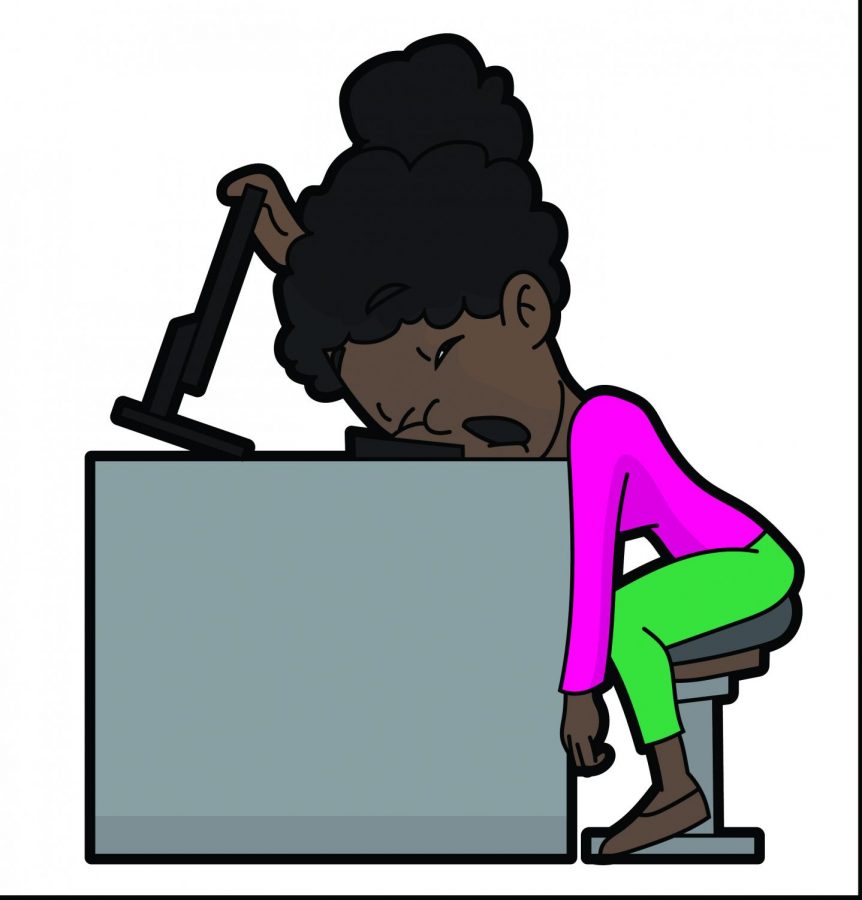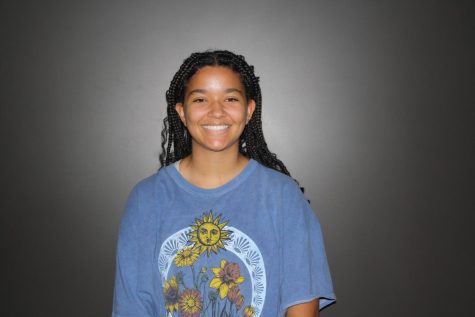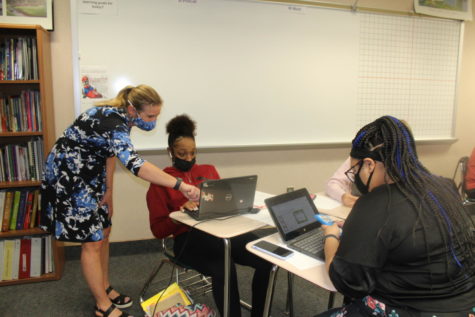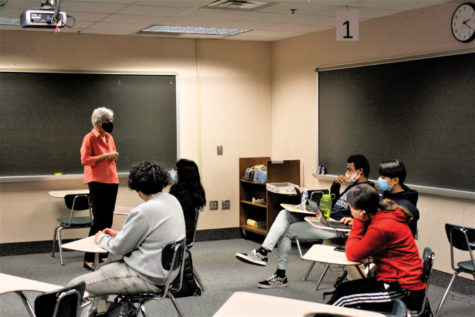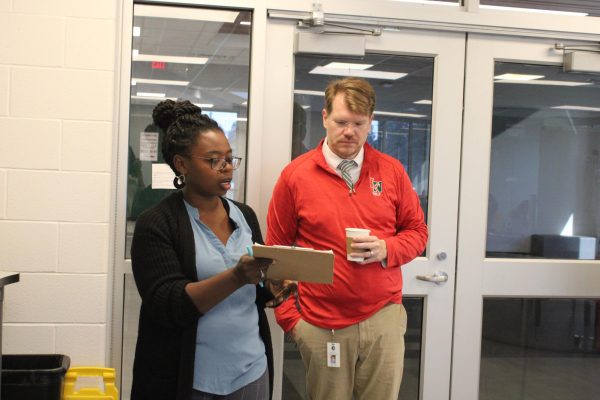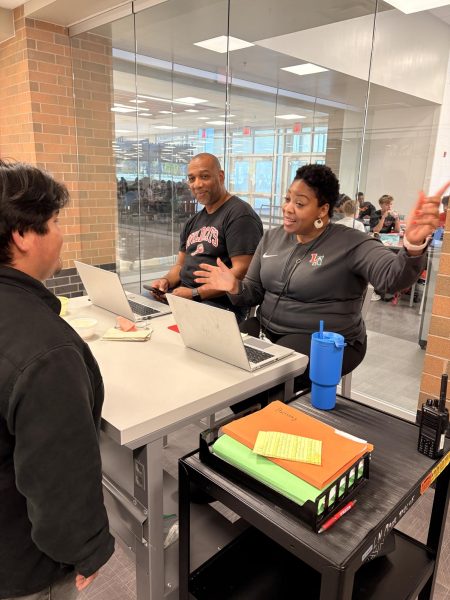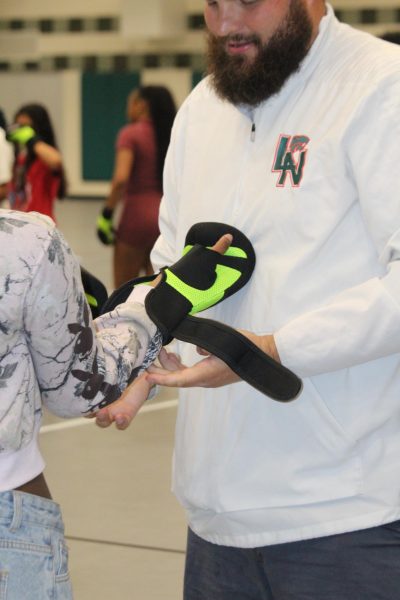Students battle sleep deprivation
One of the biggest challenges students these days face is sleep deprivation. Cell phones, caffeine, extracurriculars, and stressing about school all contribute to the difficulty of getting a good night’s rest.
It’s midnight, and senior Jesse Candelario is laying in bed with the screen of his phone lighting up his face in the dark room. He’s one of the many students who do not get the recommended amount of sleep for teenagers. For Candelario, his weakness is his phone and busy schedule. For others, the problems lie in their school work, jobs, sports, and clubs.
“School and work prevent me from getting more sleep, but my phone definitely does too. It keeps me distracted at night. The usual apps keep me up, Instagram, Snapchat, YouTube, TikTok, sometimes even Twitter. I just switch in between all of them and before I know it it’s been an hour,” Candelario said.
Candelario isn’t the only one suffering from lack of sleep due to the addictivity of his phone. Many students face the compulsive tendencies to pull out their phone in bed after a long day of school.
“Tik Tok is definitely preventing me from getting more sleep. I get distracted on the app so easily, and it prevents me from going to sleep,” Sophomore Everett Packard said.
According to the Sleep Foundation, the teenage years are an important time for mental, physical, social and emotional development, and sleep is essential during all this. Research says that while teens need between eight to 10 hours, most do not get the recommended amount. A study in 2006 showed that 45% of teens got fewer than eight hours of sleep, while other national surveys from 2007 to 2013 showed that the amount of sleep keeps decreasing for this age bracket. In 2014, the American Academy of Pediatrics called the problem of tired teenagers a “national epidemic.”
Family nurse practitioner Czarina Castillo has a background in neurology and suggests that falling asleep to an electronic device, like what Candelario does, isn’t the best scenario. The problem lies in the production of melatonin. When the sun rises in the morning the body produces cortisol, which is a hormone that makes you feel awake and ready for the day. Likewise, as the sun sets, the body naturally produces melatonin, which increases feelings of tiredness. When you turn on your phone, the screen emmits fluorescent blue lights, which can delay the production of melatonin.
“ Adults start releasing a hormone called melatonin, more so around 9 pm. With teenagers, because all the different hormones going on, teenagers are actually releasing that hormone later, around 11 pm, which explains why teenagers don’t go to bed until later to begin with,” Castillo said.
Forcing your body to wake up early and go to bed late can have more harmful effects than just feeling tired the next. It can lead to caffeine addictions and put you at risk for many short and long term problems.
“It’s a vicious cycle. You get into sleep deprivation, then you get up and you’re tired so you drink that Starbucks or that Rockstar or those Monsters. Although they help, your body gets used to it and it doesn’t replenish you very well. It can put you at risk for heart palpitations, dehydration, headaches, and migraines,” Castillo said.
These short term effects aren’t the only thing that can result from lack of sleep. Getting less than the suggested amount of sleep, which Castillo recommends is eight hours, can lead to increased cravings and a decrease in the hormone that makes you feel full. Not only this, but lack of sleep can even prevent you from growing
“There’s definitely a correlation between increased weight gain and decreased muscle mass with sleep deprivation too. For the younger students, freshman and sophomores, if you’re sleep deprived it can actually mess up your growth hormone and increase insulin levels. It can literally mess up your growth,”” Castillo said.
Along with the personal effects of sleep deprivation, it’s important to remember how it impacts others. According to Castillo, disasters such as the Three Mile Island and The Challenger, the shuttle explosion in 1986, were all catastrophic events in which sleep deprivation played a big role in them.
“If you’re sleep deprived you’re more likely to get in a car accident just because your judgement isn’t at 100 percent. When it comes to getting sleep, you have to have enough, or you’re at risk for putting other people’s lives at risk,” Castillo said.
Younger people are even more vulnerable to making risky decisions. This is due to the lack of development in the brain.
“Your brain isn’t fully developed until about the age of 25. Controlling impulses, your personality, your judgement, those types of things are controlled by the frontal lobe of your brain, which isn’t fully developed. You then add on lack of sleep and that’s just a recipe for disaster,” Castillo said.
While many students are working on fixing their sleep schedule, it can be harder for some kids due to schedules and changes with COVID-19. Many students have acknowledged that COVID-19 has ruined their sleep schedule, and they’re having trouble returning to their norm.
“I feel like I’m getting a lot less sleep than last year. My sleep schedule has definitely changed a lot with coronavirus and quarantine. I got used to sleeping in late and now I haven’t been able to go back,” Candelario said.
Castillo suggests setting cooler temperatures before bed, cutting down on screen time, and developing a constant sleep routine are all great ways to increase sleep. By developing a night time routine, the body gets on a schedule which allows it to feel more awake in the morning and more tired at night. A good night time routine has you asleep at the same time everyday, and can include yoga, reading, meditating, journaling, and so much more.
Freshman Grace Vander Sande has found her perfect night time routine. She does her skin care regiment, changes into her pajamas, stretches or meditates, drinks some water, and reads or listens to music until she’s tired.
“I almost never look at my phone at night. I just find it really bad for my mental health and overall sleep schedule,” Vander Sande said.
Vander Sande has noticed that everything about her sleeping has improved, from quality to quantity. She now has a positive relationship with sleeping and mornings, and loves to wake up early.
“I get tired earlier and am waking up earlier. I’ve actually stopped setting an alarm because I tend to wake up with the sun,” Vander Sande said.
Castillo suggests that a nighttime routine is just one great way to increase the amount of sleep you’re getting. Another great way is to stick to a sustainable schedule. One of the main things obstructing teenagers from getting more sleep are overwhelming schedules. Jobs, clubs, and sports are just another task that needs to be done after finishing schoolwork and going to bed. By keeping a sustainable schedule without an overwhelming list of tasks, she believes it’s easier to get to bed on time.
Sophomore Ava Rubick is very familiar to the feeling of an overwhelming schedule. At one point, Rubick had to juggle a job with school. As soon as she withdrew from her job, she immediately jumped into swim practice. With all of these activities going on in addition to school, it has been hard for Rubick to prioritize sleep and self care.
“Swim practice mostly interferes with my sleep schedule because some days I have to get up really early to go to practice,” Rubick said. “Other days I can sleep longer, so that makes my sleep schedule pretty inconsistent. I stress about school a lot as well, and it keeps me from getting a good night sleep.”
Nevertheless, mental health remains an important part of Rubick’s life. She continues to navigate how to find time for herself while handling her various responsibilities, and has found many ways to do this.
“I like to drink tea and take deep breaths. It helps sometimes, but it depends on the situation. I also feel like when I’m on my phone before bed I tend to stay awake longer than I want to versus being able to fall asleep sooner because I’ve been doing reading or homework,” Rubick said.
Elements of normalcy seem to have disappeared ever since the pandemic hit, especially with school. Rubick believes that she is getting much less sleep this year compared to last year.
“I feel like teachers have assigned a lot more work this year because they believe we have more free time now, which isn’t the case. So I have a lot more work to do and I had to balance that with work, and now swim practice,” Rubick said.
With nearly all of students’ work being done online, procrastination has become more popular now than ever. Rubick feels as though her time management skills could be improved upon.
“I’m not sure if I’m managing it very well, but I’m trying my best not to procrastinate and to get my work done. It’s hard to get all of the school work done when you have to balance your personal life and school. I always try to get to bed on time, which can be challenging because of all of the work. That adds to my stress because I feel like I should be doing my school work instead of sleeping,” Rubick said.
Rubick believes that there are a few things that she could do differently to improve the amount of time she’s sleeping. These simple changes could also help other students who have similar problems.
“If I could change one thing, I’d probably stop procrastinating on work so much, because then I’d have less work because I’d be getting it done. I would also spend less time on my phone because I often scroll through social media and such for hours without realizing how much time is going by,” Rubick said.
Students aren’t the only ones struggling with sleep. Teachers at Lawrence North have to juggle families and kids, planning and teaching. Isaac Masih is an English teacher and the chairman for the English department. On top of this, Masih also has a family consisting of three young children and a wife. He believes that his advice can aid many students in feeling less stressed and overwhelmed, and to help them get back on top of their work.
“My advice would be work first, play later,” Masih said. “Prioritize what you want done. Do your hardest work first. If you’re a night owl, save your hardest work for nighttime. If you’re a morning person, save it for the morning. You can focus on and concentrate and do your work. It’s really about knowing yourself and prioritizing your work.”
Everyone has a different schedule and a different way of falling asleep. Castillo stresses that no matter what you have going on, sleep should remain a priority.
“Having a plan and not just winging it, looking at when things are due and not waiting until the last minute is a great way to avoid self sabotaging and to getting more sleep,” Castillo said. “Sleep gets put on the back burner for most people and they don’t really prioritize it. It’s crucial.”



